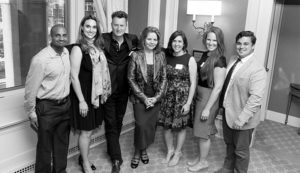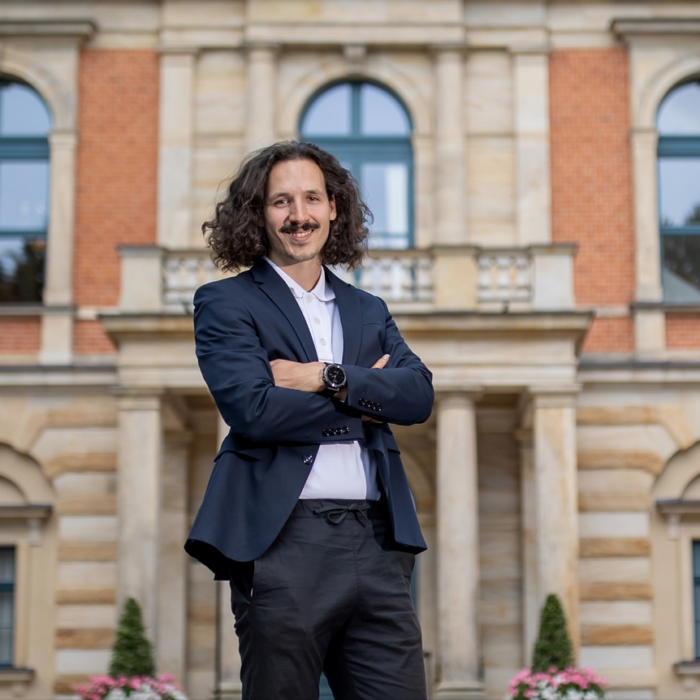
Q&A: Lisa DeAngelis on Taking Over the Leadership of Lyric Opera’s Young Professionals Program
By James Monroe ŠtevkoLisa DeAngelis, a graduate of University of Illinois’s esteemed voice program and current Alexander Technique practitioner, has been a weekend subscriber at the Lyric Opera of Chicago since she was 20. Driving up from college on the weekends, she and her mother would attend performances up in the second balcony. Little did undergraduate Lisa know, she would be taking over the Young Professionals program, a group she was first hesitant to join, as President in July 2017.
OperaWire recently spoke to her about taking the leadership position, her expectations, as well as her vision for the program.
OperaWire: What is the young professional’s organization?
Lisa DeAngelis: It began as a one-off by people who got together and talked about opera informally. They were sort of the young professionals and then in 2009, Renee Fleming came to the Lyric Opera. One of her big initiatives was pushing for a research for the young professional. Her initiative gave formal stability to what the group was. It was more about engagement and the membership stuck around 50 to 60 people for a couple of years, a number very tightly woven to whoever was in leadership positions. But in the 2015-16 season, we became a formalized board with Lyric, which meant we now had fundraising goals. That year we greatly increased our initiative, implementing our own subscription ticket series, and our membership doubled in that year! We sold all types of tickets and engaged our members like they had never been before. Since that season our membership has remained stable. Now we want to diversify and expand our age range which is 21 to 42.
OW: What ages do you have the most membership from?
LD: It is a very wide age range, it centers from mid to late 30’s. They tend to be the ones with a little more disposable income and who have more time and interest to be cultivated. Now we’re working on reaching out to the lower end, making sure we don’t miss those post-college individuals who are curious. It’s important to get them cultivated so that by the time they are in their early forties, they have been part of the Lyric donor family for 15 years. At that point, they are ready to step into the next phase of giving and the next phase of involvement of Lyric as a long-term donor.
OW: Are you speaking to a younger demographic by mentioning certain benefits for them?
LD: We have a subscription series that is solely available to our Young Professional’s members. It’s three to four dates of each opera performance. As a member, you’re eligible to buy drastically reduced tickets, which are either main floor or first balcony seats, for minimum three performances, but you can buy for every performance that is available. You can even buy a few extra so you bring friends, which is the whole point. It’s about really growing our reach.
We’ve labeled ourselves as this sort of opera curious range. You don’t have to be a longtime opera lover. It’s for those who are curious about the art form. Who are interested in learning about it. We’re educating people; making them realize that every opera is different. Just like every movie, there are different genres or languages. Just because you have come to an opera once and it wasn’t your favorite thing, doesn’t mean you don’t like opera! It just means THAT opera didn’t resonate with you; like a bad movie! You have to figure out what you like.
We’ve also tried to take the “esoteric” out of the opera. We host dinners for young professionals who are attending that evening so they can meet people who are also going and they can meet up. Cultivating the fact that opera is a community experience, not an individual experience. We’re also cultivating and fundraising for the Ryan opera center, so we aren’t only the next generation of Lyric supporters but we’re also supporting the next generation of performers, which is cool! Because, right now, we are getting to know these artists. Most of these artists will get to do amazing things worldwide very soon and we can have the experience to say “I know that person!” and we spent time getting to know them. It allows opera and performers to be regular people and not untouchables. That increases our interest and ability to cultivate true support.
OW: What kind of fundraisers do you do?
LD: We’re hosting our Halloween party for the third year. It’s a masquerade, held in the opera house Halloween weekend and all fundraising goes to the Ryan Opera Center. This has given us the ability to really expand and push the boundaries of what we have been able to do so far.
OW: Can you describe some the events you put on for the young professionals?
LD: We have our marquee funding events like this Halloween Masquerade, a yearly event that we do and also many educational opportunities. A series called “Cocktails and Conversations” where we bring in an artist or someone high up with administration at the Lyric, like Renée Fleming, talk about how the art form works; it’s insightful! We also use these events as a way to partner with other organizations. We’ve done collaborations with Chicago Council on Global affairs to talk about the historical context for some of these operas or we bring up some of the global issues in these operas that are still relevant in this day and age. The summers we get together for picnics on the Great Lawn and have happy hours. During the season, we host pre-opera dinners, reserving space and getting whatever they want to meet other fellow members and opera-goers. Previously, we did trivia night called “La Traviata”. It was lovely and also brought into light that opera is overly dramatic but totally universal! One of the categories was drunk text! A question came from “Eugene Onegin” because we’ve all had the experience of sending a text or email that we’ve greatly regretted. It helps bring these situations to reality even if we’re not going mad and killing everyone. It’s making opera real and relatable. This season, we’re turning opera librettos into colloquial librettos, so we can make these fun and engaging ideas, getting involved into what opera actually is. Yes, it’s grand; but it’s also personal and absolutely, transcendentally beautiful!
OW: What kind of feedback have you received about the program?
LD: The fact that we have been able to grow our membership is important and we have an extremely active board who is committed closing some of the gaps. We’re working with the Lyric to help us understand how many people from our demographic are actually coming to the opera that aren’t members of the young professionals, so we have a better understanding of where we can target our marketing, our fundraising, and our outreach.
OW: How did you get involved with the young professionals?
LD: I’ve been a subscriber to Lyric since I was 20 years old! When I first heard about it I did not see what the benefits were for me, because I already saw operas and already had friends who loved opera. But then I became aware of some special opportunities, like masterclasses attending backstage access sessions with Lyric artists. I thought that was really neat!
Quickly after that, I became part of the board to help with logistics planning and I saw that there was not a lot that was steady; we needed some regular opportunity that people could count on. So I instituted the free opera dinners, among other things, and conceptualized our first Halloween Masquerade. It sort of has gone from there. Now I’ll be moving from Vice President to President.
OW: What are the challenges?
LD: Being a board member of any auxiliary group is a volunteer position, so one of the big challenges is really the giving of your time and energy. Opera is something I’m passionate about; I was a singer as well, so that’s where my background comes in. That’s not always true for our members. One of the hurdles is, how do you engage people in this art form in a meaningful way? That’s difficult. You have to be a social media hound and plug people constantly. We never look pushy, but we try the hardest to expand our reach and get people to know about the events. We are finding ways to make membership meaningful but at the same time rewarding.
OW: What kind of background do your members come from?
LD: We have members who are first-time opera-goers and then get hooked to people who grew up listening to opera to former musicians to people who know nothing about it but just think it’s neat. That’s diverse and it creates a lot of interest among the group. The members are all joined together to support this art form and learn from one another.
OW: The people who go to the opera to see the American Musical Theater Initiatives, do they return to see opera?
LD: That is where the gap exists. Lyric has taken incredible initiatives to expand their reach. For example, their Sound of Music sold more than any of their other shows. A lot of people come once and we don’t know how to engage them to come again and see more. It doesn’t jump from seeing one opera and giving money. So we have to engage with these groups making it a social experience to see if they’re engaged. That is how we cultivate the sense of collaboration.
OW: How consistent are events now?
LD: Multiple performances each month are part of subscription series and we’ll have an activity related to the operas, whether it’s a pre-opera dinner, meetups at the lectures, or dessert and coffee to talk about what happened. Our big fundraisers are in the fall and spring with cocktails, events and partnership events scattered throughout the year.
OW: Dessert after the opera? That’s great!
LD: We’re finding that people are craving opportunities to talk about and process what they saw It’s a challenge in our busy schedule and operas are long. Sometimes it’s 11, 11:30 pm when the show is finished. But we’re hoping that this sense of conversation will bleed off into that. We always do something big for opening night; hosting our opening night festivity. It’s a huge to-do and is completely formal with a red carpet. Our members get dolled up, men in tuxes and women in gowns, with something planned after the show.
OW: Is Social media effective for this target demographic?
LD: People want to know what they are getting into. We’ve have had the best experience when we have been able to cultivate some of our own unique content. Filming videos of artists and individuals that we’ve had and posting it online, posting photos of young professionals who show up for shows, at times it’s been 40 to 50 people. Highlighting individual members who post on social media; we can show what our reach is like and it helps build our experience. After our masquerade, there was great response because people got excited; knowing what kind of costumes to wear and getting a feeling of what the event was like. When your resources are limited, you have to use what you have to create content that engages, increases visibility and educates to be part of the experience.


